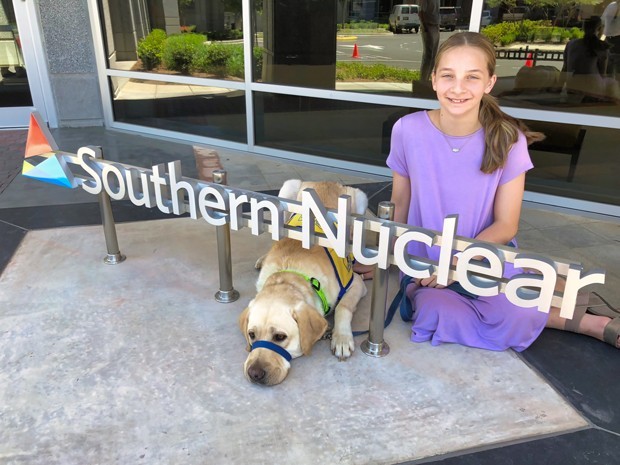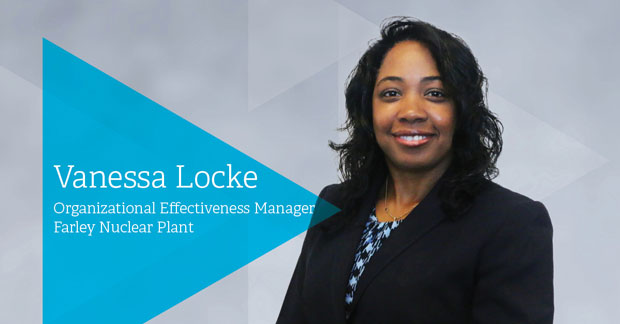McClain, a service dog in training, and Jim DeLano introduce SNC to the role of canine assistants
A puppy named McClain has cleared the path should a Southern Nuclear employee ever need to have a service dog at work.
McClain is a canine assistance animal in training who has been coming to SNC’s corporate office since March. He accompanies Jim DeLano, lead environmental specialist in Environmental Affairs, whose family is training the dog.
“We got McClain in January from Canine Companions for Independence (CCI), and we’ll have him until August,” DeLano says. “My daughter Amelia is actually the puppy raiser.”
CCI provides assistance dogs free of charge to adults, children or veterans with disabilities, or to professionals who are assisting clients with special needs. The organization breeds labrador retrievers, golden retrievers and a cross of the two to be assistance dogs.
The breeders care for the newborn puppies for eight weeks. After that, the puppies spend up to18 months with volunteer puppy raisers who provide basic obedience training, socialization and care.
DeLano said when Amelia, who is 11 years old, decided she wanted to be a puppy raiser, the family applied to the program, interviewed and was accepted.
McClain spent his first year in CCI’s prison puppy-raising program. He was at a prison in Montgomery, Ala., where an inmate provided his initial training.
“Now, we’re finishing up his socialization,” explains Victoria DeLano, Jim’s wife. When they got McClain, “He didn’t know how to do stairs!”
As required by CCI, Amelia teaches McClain basic commands, attends an obedience class with him, keeps him on a leash except when he’s in a fenced area or a crate, and submits monthly progress reports.
As part of McClain’s socialization, he also goes to work with Jim. “I warned folks before he started coming,” he said. “Then I introduced him to everyone on his first day. Once they got over the initial ‘there’s a dog here,” they didn’t really notice him. He’s not a distraction.”
Because he’s the first service dog to “work” at Southern Nuclear, McClain is also introducing employees to the role of a canine assistant. That’s a good lesson to learn, should an employee ever need a dog at work.
McClain won’t be at SNC much longer, however. In August, Amelia and Victoria will travel with him to Orlando for his matriculation ceremony. “He’ll wear a cap and gown,” points out Victoria. He’ll then be turned over to a professional trainer for six to nine months. He’ll learn more than 40 advanced commands that will support his work as a service dog.
That training will culminate in a graduation ceremony where he will be matched with a recipient. Amelia and Victoria hope to return to Orlando for that, where Amelia will turn over McClain’s leash to the lucky new companion who needs a hearing or mobility dog.
Jim and Victoria are very familiar with how important a canine assistant is to his or her owner. Their son, James, who sometimes needs a wheelchair, has a service dog named Lennie. The dog can open doors, pick up items and carry them upstairs to James, and turn on and off lights.
“Lennie is James’ best friend,” says Victoria. “He loves to work, and he’s with him every minute, even when James had to be in the hospital.”
In fact, Lennie is the reason Amelia wanted to be a puppy raiser. “We’ve taught Amelia and James the importance of giving to others,” Victoria continues.
“Our work with McClain matches up with our Southern Company values,” Jim says. “By training McClain, we’re being a steward for someone else. We’re committed to that person’s success.
“A service dog can transform someone’s life,” he continues. “The dog can give that person an independence they didn’t have before and a reason to keep going.”
James DeLano’s tips for meeting a service dog
James DeLano, who has a service dog, is the 13-year-old son of employee Jim DeLano. James offers these tips for meeting a service dog:
- Don’t touch the assistance dog without first asking permission.
- Never feed the dog.
- Don’t whistle or make sounds that could distract the service dog.
- Don’t be afraid of the dog.
And finally, James says, speak to the person, not the service dog. And never make assumptions about the intelligence, feelings or capabilities of the person with the canine assistance animal.
Editor’s note: If you’d like to find out more about the Canine Companions organization or becoming a puppy raiser, click here.
 Amelia DeLano is raising and socializing McClain, a service dog in training. McClain often accompanies Amelia’s dad, Jim, to work at SNC.
Amelia DeLano is raising and socializing McClain, a service dog in training. McClain often accompanies Amelia’s dad, Jim, to work at SNC.

